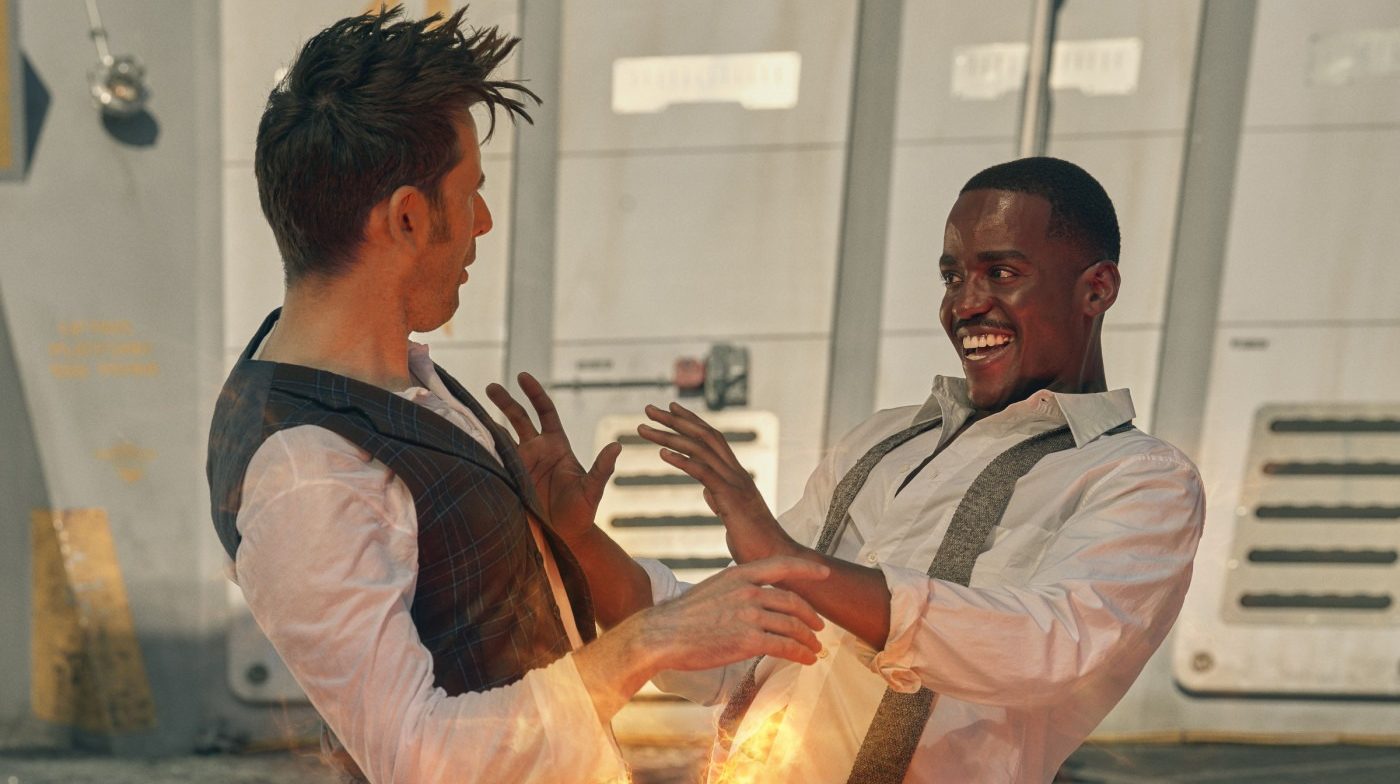Doctor Who finale ‘The Giggle’ presents a fun but clumsy conclusion
And here we are, the culmination of Doctor Who‘s 60th anniversary celebrations and specials, following on from Wild Blue Yonder the previous week. ‘The Giggle’ is a packed episode that tries to juggle many different threads and concepts, saying goodbye (once again) to David Tennant’s Fourteenth Doctor and Catherine Tate’s Donna Noble, reintroducing the Toymaker (Neil Patrick Harris) after 57 years of absence, and the dazzling debut of Ncuti Gatwa’s Fifteenth Doctor (in his underpants no less), pointing to an exciting new era for the show. Did the episode succeed, or did it ultimately struggle in attempting to juggle too many balls at once?
Tennant puts in one of his strongest performances ever as the Doctor, exhibiting the full spectrum of emotions
Tennant puts in one of his strongest performances ever as the Doctor, exhibiting the full spectrum of emotions. From pure rage at the Toymaker (last seen played by Michael Gough in the 1966 series ‘The Celestial Toymaker’ opposite William Hartnell’s First Doctor), to grief for his past failures, fear for losing this face again, before ending with the happiest the Doctor has ever been. This is not a performance to be missed. Whether you’ve been a fan of his Doctor since 2005 or have only just discovered the show, you will not be disappointed.
In what appears to be the Fourteenth Doctor’s final showdown, he is struck by a fatal laser beam by the Toymaker; it is what the entirety of the fandom feared the most: that we will once again have our hearts broken by saying goodbye to David Tennant’s Doctor. Here we come to potentially the biggest twist in Doctor Who’s history and the most controversial element of the episode, the brand-new concept of “Bi-generation”. The concept asserts that there is an infinitely rare chance that instead of a Timelord simply regenerating, they will in fact grow a second body while healing their former selves. So, we find ourselves directly with two Doctors at once, both Tennant’s Fourteenth Doctor and Gatwa’s Fifteenth Doctor who both proceed to challenge the Toymaker to a game of catch, defeating him after some close calls.
Rightly, in my mind, this is the most controversial aspect of the story. Doctor Who, as a show, has always thrived on change and the ability to completely reinvent itself every few years. This concept poses an obstacle to that founding principle. Part of the uniqueness and beauty of this show in having the same character played by, often radically, different actors is that you say goodbye to one actor and hello to another, but we still have the continuity of this being essentially the same character with the same experiences and memories. As the Eleventh Doctor once said: “I will always remember when the doctor was me.” Giving the Doctor the ability to change while simultaneously keeping the old one around cheapens this element.
Forcing Gatwa’s new Doctor to share his crucial first scenes with Tennant – scenes that should allow Gatwa the unimpeded ability to showcase what his Doctor will be – is a poor choice
Like most people, I did not ‘want’ to say goodbye to Tennant again. He is my ‘Doctor’, having started watching in 2006 during Tennant’s first series, but nonetheless, this is a show about change and progress. As Dr. Seuss said: “Don’t cry because it’s over. Smile because it happened.” Tennant is arguably the most popular Doctor in the show’s history, so forcing Gatwa’s new Doctor to share his crucial first scenes with Tennant – scenes that should allow Gatwa the unimpeded ability to showcase what his Doctor will be – is a poor choice. However, Russell T. Davies has maintained that this is an event with consequences, which will be explored further as we move through Gatwa’s tenure as the Doctor. I believe this to be a clumsily established concept, but I will reserve my full judgment to see how it will be handled going forward.
The performances are all-around phenomenal throughout, with a marvellously written story for the most part, which is let down by an underdeveloped conclusion and an underexplained (and highly controversial) concept in “Bi-generation”. ‘The Giggle’ provides a satisfying, albeit at times clumsily written, conclusion to Doctor Who’s 60th Anniversary specials.

Comments (1)
Sorry, but creating a duplicate TARDIS with a magical hammer was a bit much, even for me.